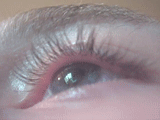Fasciculation

Editor-In-Chief: Prab R Tumpati, MD
Obesity, Sleep & Internal medicine
Founder, WikiMD Wellnesspedia &
W8MD's medical weight loss NYC, sleep center NYC
Philadelphia medical weight loss and Philadelphia sleep clinics
| Fasciculation | |
|---|---|

| |
| Synonyms | N/A |
| Pronounce | N/A |
| Specialty | N/A |
| Symptoms | Muscle twitch |
| Complications | N/A |
| Onset | N/A |
| Duration | N/A |
| Types | N/A |
| Causes | Motor neuron disease, Peripheral nerve hyperexcitability, Electrolyte imbalance, Stress |
| Risks | N/A |
| Diagnosis | Clinical diagnosis, Electromyography |
| Differential diagnosis | Myokymia, Myoclonus, Tremor |
| Prevention | N/A |
| Treatment | Reassurance, Magnesium supplementation, Beta blockers |
| Medication | N/A |
| Prognosis | N/A |
| Frequency | Common |
| Deaths | N/A |
Fasciculation is a brief, spontaneous contraction affecting a small number of muscle fibers, often causing a flicker of movement under the skin. These involuntary muscle twitches are typically benign but can be associated with various neurological conditions.
Causes[edit]
Fasciculations can be caused by a variety of factors, including:
- Benign fasciculation syndrome
- Amyotrophic lateral sclerosis (ALS)
- Spinal muscular atrophy
- Peripheral neuropathy
- Myopathy
- Electrolyte imbalance
- Stress and anxiety
- Caffeine and other stimulants
Symptoms[edit]
The primary symptom of fasciculation is the visible twitching of muscles, which can occur in any voluntary muscle group. Common areas include the eyelid, calf, and thumb. These twitches are usually painless but can be annoying or concerning to the individual experiencing them.
Diagnosis[edit]
Diagnosis of fasciculations typically involves a thorough medical history and physical examination. Additional tests may include:
- Electromyography (EMG)
- Nerve conduction study
- Blood tests to check for electrolyte imbalances or other underlying conditions
- Magnetic resonance imaging (MRI) to rule out structural abnormalities
Treatment[edit]
Treatment for fasciculations depends on the underlying cause. In cases where fasciculations are benign, no treatment may be necessary. For other causes, treatment options may include:
- Addressing electrolyte imbalances
- Managing stress and anxiety
- Reducing caffeine and stimulant intake
- Medications for underlying neurological conditions
Prognosis[edit]
The prognosis for individuals with fasciculations varies depending on the underlying cause. Benign fasciculations generally have a good prognosis and do not lead to serious health issues. However, fasciculations associated with neurological diseases may indicate a more serious condition that requires ongoing management.
See also[edit]
References[edit]
<references group="" responsive="1"></references>
Ad. Transform your life with W8MD's Budget GLP-1 injections from $75


W8MD offers a medical weight loss program to lose weight in Philadelphia. Our physician-supervised medical weight loss provides:
- Weight loss injections in NYC (generic and brand names):
- Zepbound / Mounjaro, Wegovy / Ozempic, Saxenda
- Most insurances accepted or discounted self-pay rates. We will obtain insurance prior authorizations if needed.
- Generic GLP1 weight loss injections from $75 for the starting dose.
- Also offer prescription weight loss medications including Phentermine, Qsymia, Diethylpropion, Contrave etc.
NYC weight loss doctor appointmentsNYC weight loss doctor appointments
Start your NYC weight loss journey today at our NYC medical weight loss and Philadelphia medical weight loss clinics.
- Call 718-946-5500 to lose weight in NYC or for medical weight loss in Philadelphia 215-676-2334.
- Tags:NYC medical weight loss, Philadelphia lose weight Zepbound NYC, Budget GLP1 weight loss injections, Wegovy Philadelphia, Wegovy NYC, Philadelphia medical weight loss, Brookly weight loss and Wegovy NYC
|
WikiMD's Wellness Encyclopedia |
| Let Food Be Thy Medicine Medicine Thy Food - Hippocrates |
Medical Disclaimer: WikiMD is not a substitute for professional medical advice. The information on WikiMD is provided as an information resource only, may be incorrect, outdated or misleading, and is not to be used or relied on for any diagnostic or treatment purposes. Please consult your health care provider before making any healthcare decisions or for guidance about a specific medical condition. WikiMD expressly disclaims responsibility, and shall have no liability, for any damages, loss, injury, or liability whatsoever suffered as a result of your reliance on the information contained in this site. By visiting this site you agree to the foregoing terms and conditions, which may from time to time be changed or supplemented by WikiMD. If you do not agree to the foregoing terms and conditions, you should not enter or use this site. See full disclaimer.
Credits:Most images are courtesy of Wikimedia commons, and templates, categories Wikipedia, licensed under CC BY SA or similar.
Translate this page: - East Asian
中文,
日本,
한국어,
South Asian
हिन्दी,
தமிழ்,
తెలుగు,
Urdu,
ಕನ್ನಡ,
Southeast Asian
Indonesian,
Vietnamese,
Thai,
မြန်မာဘာသာ,
বাংলা
European
español,
Deutsch,
français,
Greek,
português do Brasil,
polski,
română,
русский,
Nederlands,
norsk,
svenska,
suomi,
Italian
Middle Eastern & African
عربى,
Turkish,
Persian,
Hebrew,
Afrikaans,
isiZulu,
Kiswahili,
Other
Bulgarian,
Hungarian,
Czech,
Swedish,
മലയാളം,
मराठी,
ਪੰਜਾਬੀ,
ગુજરાતી,
Portuguese,
Ukrainian
